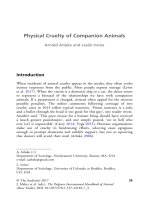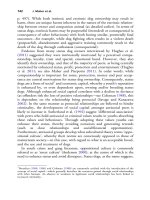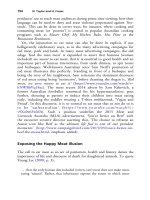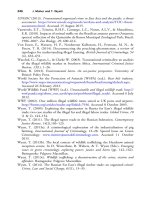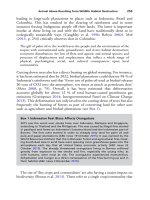The palgrave international handbook of a 257
Bạn đang xem bản rút gọn của tài liệu. Xem và tải ngay bản đầy đủ của tài liệu tại đây (33.93 KB, 1 trang )
Animal Abuse Resulting from Wildlife Habitat Destruction
253
leading to large-scale plantations in places such as Indonesia, Brazil and
Colombia. This has resulted in the clearing of rainforests and in some
instances forcing Indigenous people off their lands. The latter is important
insofar as those living on and with the land have traditionally done so in
ecologically sustainable ways (Caughley et al. 1996; Robyn 2002). Mol
(2013, p. 254) critically observes that in Colombia:
The gift of palm oil to the world leaves the people and the environment of the
tropics with contaminated soils, groundwater, and rivers; habitat destruction;
ecosystem disturbances; the loss of flora and aquatic and animal species; and
processes of displacement and emplacement that inflect a whole range of
physical, psychological, social, and cultural consequences upon local
communities.
Cutting down trees also has a direct bearing on global warming. For instance,
it has been estimated that by 2022, biofuel plantations could destroy 98 % of
Indonesia’s rainforests and that ‘Every ton of palm oil used as biofuel releases
30 tons of CO2 into the atmosphere, ten times as much as petroleum does’
(Shiva 2008, p. 79). Overall, it has been estimated that deforestation
accounts globally for about 12 % of total human-caused greenhouse gas
emissions (Greenpeace 2014; Intergovernmental Panel on Climate Change
2013). This deforestation not only involves the cutting down of trees but also
frequently the burning of forests as part of converting land for other uses
such as agriculture and biofuel plantations (see Box 1).
Box 1 Indonesian Peat Blaze Affects Orangutans
2015 saw the worst ever smoke haze over Indonesia, Malaysia and Singapore,
extending to Thailand and the Philippines. This was caused by illegal fires started
in peatland and forest on Indonesia’s Sumatra Island and the Indonesian part of
Borneo. The fires were started in order to cheaply clear land for palm oil and
pulp and paper plantations (ABC news 19 October 2015). It was claimed by the
World Resources Institute that the Indonesian forest and agricultural fires cloaking South-East Asia in acrid haze were spewing more greenhouse gases into the
atmosphere each day that all United States economic activity (ABC news 22
October 2015). The already threatened orangutans living in Borneo suffered
greatly from exposure to the smoke and fire, especially the young who, as
with humans, were most at risk. The orangutans experienced malnutrition,
dehydration and hunger as a direct consequence of the fires burning up and in
their habitat (ABC news 2 November 2015).
The rise of ‘flex crops and commodities’ are also having a major impact on
biodiversity (Borras et al. 2013). These refer to a single crop/commodity that
